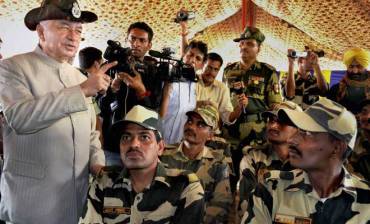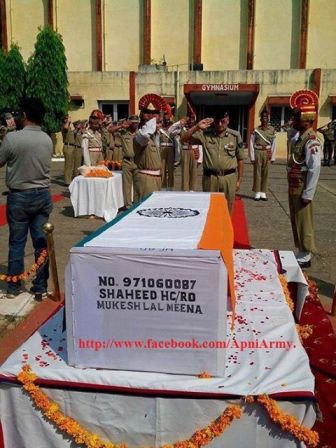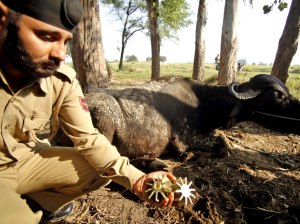
Take it up with the sultans, Perkasa tells Kamalanathan
 Faz: Perkasa,
being the extension of Umno Baru, behaves just like Umno Baru but more.
Its basic tenets are Malays, Islam and sultan/raja. Its shadow-plays
will always be related to all or any one of the above tenets.
Faz: Perkasa,
being the extension of Umno Baru, behaves just like Umno Baru but more.
Its basic tenets are Malays, Islam and sultan/raja. Its shadow-plays
will always be related to all or any one of the above tenets.Never mind about cleanliness, the suitability of the location as temporary abattoir and the more important ‘Halalan Thoi'iban' (halal, suci dan bersih). Muslims should be thinking of providing better facilities at mosques and surau to facilitate these Korbans.
This is the 21st century and Muslims should be addressing these issues in line with modern practice. What our past generation did was to utilise what was available then. Surely, we Muslims have come a long way since then.
RR: Deputy Education Minister II P Kamalanathan's statement is a rational one. Schools are not slaughtering houses. Children of any race cannot stand to see the pain and struggle of an animal being killed.
Since it is a ritual, do it in a place of worship. It is as simple as that. This should be the decision of the 1Malaysia and the schools be advised accordingly. Why drag the sultans into this simple matter?
Let us be reasonable and rational, and maintain peace and harmony in this nation.
Worried Sick: Kamalanathan, stand firm! Don't be cowed by Ibrahim Ali. I can assure you that 99.99% of our Malay and Muslim brothers do not want schools to be turned into slaughter houses.
Everybody cares for their children and will never want them to be bigots like Ibrahim. If you feel that you cannot get the support of your minister or the PM, then the honourable thing for you to do is to tender your resignation. Everyone will respect you for that.
It is time for you to be a man. Do not be like KTK (former Gerakan chief Koh Tsu Koon). See what happened to him.
Be like MIC leader S Sothinathan and please do not go hand-kissing again. If you act like a deputy minister following all rules and laws, the people will be behind you and not behind those who slaughter cows among school kids. I wish you well.
Anonymous #039163649: I appeal to the Chinese not to be a ‘batu api' (instigators) between Hindus and Muslims by making a big issue of this matter.
Many Hindu parents I talked to, said cow slaughtering in schools was no big deal as long as their children were not forced to attend and watch.
Also there are Umno instigators who are pretending to be the Hindus and making an issue out of this so that it can claim that Islam is under siege and Umno is the sole protector and so vote for Umno.
I suspect many attacks on Islam are made by these instigators who want to make Muslims feel insecure.
Hplooi: This is as stark as you can get. Ibrahim Ali and his gang control the government, both inside and outside. Mr 'Chinese-Tsunami' CEO of Malaysia is deathly (or elegantly) silent, which means the power behind the scene is now the extreme right-wing.
Note that key policy posts (Home, Defence Ministry) are held by key elements of the extreme right-wing. This extreme right-wing is now flexing its muscles by pushing the limits of tolerance. e.g. korban in school has never been the norm but is now peddled by the extreme right-wing as the norm.
The message is not for us but the common rural constituent who will tend to believe such stories. Therein the danger. Malaysia, as a nation originally conceived, is now being slowly destroyed.
What say you MCA, Gerakan, MIC? This is not about partisan politics but about the very future of our next generation.
People Power: Nobody is asking the Muslim to stop this religious ritual. Just don't do it in schools. Is that too hard to understand?







 The
upshot: the Najib administration has lost more support than it would
have gained if it had steered by a course that worked the middle ground
while ignoring the lunatic fringe.
The
upshot: the Najib administration has lost more support than it would
have gained if it had steered by a course that worked the middle ground
while ignoring the lunatic fringe. Perkasa
were against any economic and political liberalisation, a leaning which
was the seeming preference of the new broom PM who had no less than his
deputy, Muhyiddin Yassin, acting like he was the Perkasa tether on
Najib's tilt towards liberalism.
Perkasa
were against any economic and political liberalisation, a leaning which
was the seeming preference of the new broom PM who had no less than his
deputy, Muhyiddin Yassin, acting like he was the Perkasa tether on
Najib's tilt towards liberalism. These
moves have undermined his reformist credentials but they have won him
endorsements from his party's electorate, as reflected in the triumph of
his slate of candidates in Umno's internal elections held earlier this
month.
These
moves have undermined his reformist credentials but they have won him
endorsements from his party's electorate, as reflected in the triumph of
his slate of candidates in Umno's internal elections held earlier this
month.
 In a blog posting today, Mahathir (left) said that a "classic case" which debunks the argument was how Umno was declared illegal in 1988 by the courts.
In a blog posting today, Mahathir (left) said that a "classic case" which debunks the argument was how Umno was declared illegal in 1988 by the courts.  Anwar (right) eventually
Anwar (right) eventually  The final example cited by Mahathir was how the High Court had
The final example cited by Mahathir was how the High Court had 
 Shabudin Yahaya (BN-Tasek Gelugor - left)
described the slaughter as a practical lesson for the Islamic Studies
subject when interjecting to M Kulasegaran (DAP-Ipoh Barat) during the
budget debate in Parliament.
Shabudin Yahaya (BN-Tasek Gelugor - left)
described the slaughter as a practical lesson for the Islamic Studies
subject when interjecting to M Kulasegaran (DAP-Ipoh Barat) during the
budget debate in Parliament. Earlier, Kulasegaran (right)
had complained about the slaughtering of cows on school grounds during
the Aidiladha celebration which he said hurt the sensitivities of Hindu
who deem the creature sacred.
Earlier, Kulasegaran (right)
had complained about the slaughtering of cows on school grounds during
the Aidiladha celebration which he said hurt the sensitivities of Hindu
who deem the creature sacred. Kulasegaran also chastised Persatuan Hindraf Malaysia over the lack of its proposals in the recent Budget 2014.
Kulasegaran also chastised Persatuan Hindraf Malaysia over the lack of its proposals in the recent Budget 2014.






 "The
most obvious example would be in Pasir Mas, where Perkasa president
Ibrahim Ali himself contested and failed to get the support from the
locals, including the Malays," Lau (left) said in a statement today.
"The
most obvious example would be in Pasir Mas, where Perkasa president
Ibrahim Ali himself contested and failed to get the support from the
locals, including the Malays," Lau (left) said in a statement today.


 “Kelantan has made efforts to enforce hudud for a long time but was unsuccessful because of various obstacles.
“Kelantan has made efforts to enforce hudud for a long time but was unsuccessful because of various obstacles. 







 He
said this on Oct 22, during the debate in Parliament on the amendments
to the Security Offences (Special Measures] Act (Sosma). The amendments
seek to place organised crime as an offence punishable under Sosma.
He
said this on Oct 22, during the debate in Parliament on the amendments
to the Security Offences (Special Measures] Act (Sosma). The amendments
seek to place organised crime as an offence punishable under Sosma. A court decision in Team B's favour would have meant the end of Mahathir's grasp on power.
A court decision in Team B's favour would have meant the end of Mahathir's grasp on power. Through
its grisly career, the ISA has been used most blatantly by the ruling
coalition to cripple its political opponents, most notably the arrest
and detention of practically the entire leadership of the Socialist
Front, the main threat to the Alliance during the Sixties.
Through
its grisly career, the ISA has been used most blatantly by the ruling
coalition to cripple its political opponents, most notably the arrest
and detention of practically the entire leadership of the Socialist
Front, the main threat to the Alliance during the Sixties.